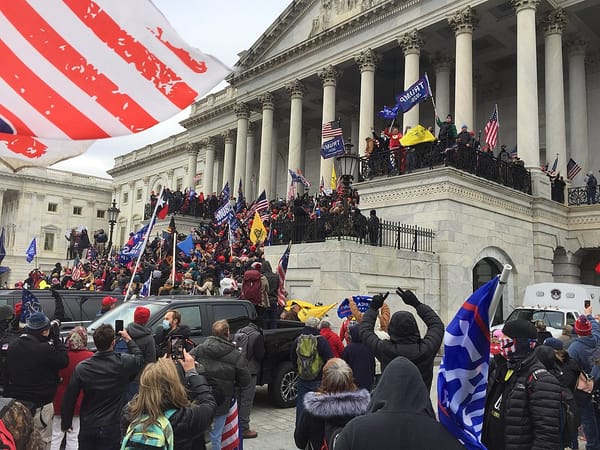Elon Musk and Conservative Non-Electoral Politics

Democrats, whether politicians or pundits, constantly urge their partisans to vote as the solution to just about every possible problem. Obama famously told a crowd not to boo Donald Trump, but to vote against him. Willie Nelson campaigned for Democrats by leading a crowd in a sung chant: “Vote them out!” Democratic president Joe Biden urged people to vote for Democrats to protect abortion rights. .
The constant refrain “vote!” can get wearisome, especially when it seems to have little effect; voters elected a unified government of Democrats in 2020, but that didn’t stop the Supreme Court from gutting abortion rights. And surely you can both boo Donald Trump and vote—the first might even be a fun way to encourage people on to the second.
But even if it can get monotonous, it makes sense that elected officials, and those focused on elections, would spend a lot of their time talking about voting. Elected officials are primarily, and sometimes monomaniacally, focused on elections. For better or worse, that’s how democracy works.
GOP elected officials, though, often don’t focus on voting as a force for change. And conservative public figures in general care even less about elections.
In this regard, Elon Musk, who appears not to have voted in the 2022 midterms, is a typical example of a contemporary conservative. Elon Musk’s tenure at Twitter has been such a rolling disaster that it’s hard to keep up with it all, so you can be forgiven if you missed this tidbit. It’s worth revisiting, though. Musk’s failure to get to the ballot is another sign of his cluelessness and general ridiculousness. But it’s also I think an instructive example of the rising indifference on the right towards elections.
The GOP is less and less focused on voting, and more and more focused on conspiracy theories, harassment, and populist violence as a means and an end in themselves. This makes it harder for them to win elections. But, as Musk shows, the focus on non-electoral organizing gives a wide scope for cruelty, and for harming those the right loves to harm.
Musk claims to have once been a Democrat and has even (laughably) called himself a socialist. But there’s little doubt at this point that he is a committed far right GOP partisan. In the run-up to the 2022 midterms, he urged “independent-minded” voters to cast their ballots for Republicans to balance the Democratic president. He added that leading Democrats had been subjecting him to “unfair attacks.” He didn’t mention that Democrats had been criticizing him because practically his first act as CEO of Twitter was to tweet out a baseless, cruel conspiracy theory spreading vile smears about House Speaker Nancy Pelosi’s husband, Paul, shortly after the latter was viciously attacked in his home with a hammer.
More broadly, Musk has consistently and enthusiastically catered to the far right on Twitter, reinstating fascist and Qanon accounts, rushing to chat with and address complaints from right-wing media accounts and right wing influencers like “catturd”, and (as already mentioned) spreading right wing conspiracy theories. He elevates the right; he networks with people on the right; he pushes right wing talking points; he tells his followers to vote Republican.
But while Musk told his followers to vote, he didn’t vote himself. That’s typical of Republicans. They may ask their partisans to go to the polls before an election. But it feels pro forma. The real enthusiasm and energy in right wing politics is reserved, not for voting, but for violence.
There are plenty of examples of Republicans cheering on violence. But perhaps the most illustrative example of the turn against voting is former President Trump’s behavior throughout his electoral career.
Trump of course denied the results of the 2020 election when he lost. But people tend to forget he busily attacked the results of the 2016 election before it occurred. With the polls against him, Trump claimed without evidence that the election was going to be “rigged” and said there would be “massive fraud” favoring Democrats.
Trump kept pushing those conspiracies even after he won. He insisted (again completely without evidence) that millions of immigrants had voted illegally for Democrats, and that he would otherwise have won the popular vote as well as the electoral college.
Four years later, in 2020 he was back at it. Even before the election was held, he claimed that Democrats were rigging the vote, and that if he lost, the results would be illegitimate.
Trump pushed claims of vote rigging in 2020 because he planned to contest the election results, ultimately encouraging a violent coup attempt. If you want to launch a violent takeover of the US, then denigrating and undermining elections is a smart move. If you want to win elections, though, telling your supporters that elections are rigged and their vote doesn’t count is not such a great tactic.
Republicans themselves have acknowledged as much. Many in the GOP believe that Trump’s election denial nonsense demobilized voters in Georgia in 2021, leading to Republican senate candidates going down to defeat. Or as conservative radio host Erick Erickson put it “Telling everyone that the race was stolen when it wasn’t cost the Republicans two Senate seats.”
In the same vein, the GOP has quietly and ineffectually started to grapple with the fact that demonizing some voting methods has hurt them at the ballot box. Trump has attacked early and absentee voting methods which many Democrats embraced, especially in the pandemic.
The problem is that Trump’s attacks have been so effective that they’ve led Republicans to avoid those voting methods—and sometimes led them to avoid voting altogether. According to GOP strategist Karl Rove, Trump is “creating a class of people who may for a long time believe the elections are stolen as long as there’s a presence of mail-in ballots, and that causes people to say my vote doesn’t count, I don’t need to bother to vote.”
Blaming Trump is relatively easy since he’s not an establishment politician and is grotesquely horrible in numerous respects. But it’s not just Trump. The GOP loves amplifying voter fraud claims and insisting that elections are rife with voter fraud. When you do that, you tell your own voters that elections aren’t worth contesting.
They’re especially not worth contesting when you can embrace other kinds of political actions—like, say, harassing marginalized people until you force the closing of your local public library, or storming Congress.
Musk, as one example, obviously enjoys being a troll a lot more than he enjoys voting. Voting is boring and tedious and anonymous; everybody does it and you don’t get a lot of credit for doing it. On the other hand, when you’re a right wing troll, other right wing trolls give you high fives and tell you you’re a genius.
You can also weaponize your thuggish political movement to settle personal scores. Musk’s done that too, most notably when he targeted Twitter’s former head of Trust and Safety, Yoel Roth. Roth had, very gently, pushed back on the idea that Twitter should become a haven for Nazi assholes. Musk responded by not just firing him, but falsely claiming that his pre-Twitter work on child protection issues had advocated for the abuse of children. Roth is Jewish and gay, so Musk’s right wing fandom was eager to have an excuse to destroy him. He got credible death threats and was forced to flee his home.
Democratic insiders, focused on electoral outcomes, sometimes dismiss non-electoral organizing and harassment. Financial Times editor Edward Luce, for example, argued that it was foolish to advocate for trans causes since it’s an issue which only matters to a “small minority.” “What sense does it make to depict J.K. Rowling as a fascist?” he asked plaintively in the run-up to the midterms. Former Democratic nominee Hilary Clinton agreed, at least to the extent that she believed that Democrats should focus on…winning votes.
We are standing on the precipice of losing our democracy, and everything that everybody else cares about then goes out the window. Look, the most important thing is to win the next election. The alternative is so frightening that whatever does not help you win should not be a priority.
Elections are important; the Republicans hurt their cause and their movement when they discourage their followers from voting.
But what Democrats can sometimes miss is that non-electoral organizing matters too. It’s important because it’s a moral imperative when fascists are very deliberately coming for trans people, Black people, and other marginalized groups. If you’re so focused on keeping Democrats electable that you, an ordinary citizen who isn’t running for office, can’t fight for people at libraries, at hospitals, and in the street, then what is the point of your politics? You have to be committed to helping people, not just to winning.
Even if you are just committed to winning, though, building extra-electoral power is an imperative, because without it electoral power erodes—or at worst, becomes irrelevant. If you don’t find a way to stand up to fascist gangs, they’ll prevent your partisans from voting. If you can’t turn out counter protestors in larger numbers, the next insurrection might succeed.
None of this is to say that Elon Musk is a canny strategist for not voting. But by taking over Twitter and handing it to the far right, he’s certainly done more to advance fascism than he could have managed at the ballot box. The fight for democracy takes place in the voting booth, but not just at the voting booth. Those working against fascism should recognize and take advantage of the fact that fascists are not great at electoral politics. But fascist tactics aren’t restricted to electoral politics. Those opposing them can’t focus all their attention on elections either.
Featured Image is Elon Musk, by Daniel Oberhaus




